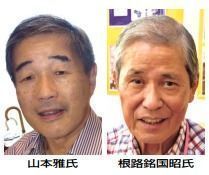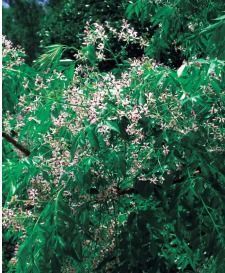Chinaberry found to induce “self-eating” in cancer cells

November 11, 2016 Hisao Miyagi of Ryukyu Shimpo
[Nago] On November 10, scientists found that the component in the leaves of chinaberry trees, native to
Okinawa, can induce autophagy in cancer cells, and can ultimately kill the cells. Experts in virus research, Director-General Kuniaki Nerome of the Institute of Biological Resources in Nago and Professor Tadashi Yamamoto, a molecular biologist who is a part of the Cell Single Unit at
the Okinawa Institute of Science and Technology Graduate University (OIST), made this discovery. Chinaberry has been proven effective on 70 types of human cancer. The anticancer activity of chinaberry was discovered in 2004 by Nerome, but had not been found to kill cancer cells at that point. Now, there is a higher likelihood of chinaberry being developed into a drug, which may greatly contribute to cancer treatment.

Chinaberry growing in Yambaru, the forested northern part of mainland Okinawa.
Autophagy is a “self-eating” process in which cells break down their own protein and recycle it. Tokyo Institute of Technology Emeritus Professor Yoshinori Ohsumi, age 71, was awarded the Nobel Prize in Physiology or Medicine on October 3 for uncovering this mechanism.
Nerome applied for a patent for chinaberry inducing autophagy in cancer cells on November 10. On November 11, he presented a special lecture at the 70th Annual Meeting of the Japanese Society of National Medical Services hosted at the Okinawa Convention Center. In the near future, Nerome and Yamamoto plan to co-author a paper in a U.S. medical journal.
After removing the toxins from the component extracted from the Okinawan chinaberry, Nerome
administered this to mice with cancer. He found that the chinaberry component killed colorectal, lung, and stomach cancer cells. With cultured cells, it killed 70 types of cancer. He also administered this to about 30 dogs with cancer and found that it eliminated tumors in 76 percent of the dogs and/or stopped the growth of cancer.
Nerome’s research found that the 11 types of chemicals found in the component extracted from chinaberry prevent the division of cancer cells and DNA synthesis. He requested Yamamoto’s assistance in 2014 when he could not determine the reason for the phenomena. They discovered that the chinaberry was responsible for inducing autophagy in cancer cells this past January.
Nerome says, “It works better than existing anticancer drugs and it is administered orally with no side effects. We hope to develop this into a drug and to start a new industry in Okinawa.” Yamamoto says, “There is no doubt that it kills cancer cells and prevents cancer from spreading. It’s good news and an effective method of treatment for cancer patients. This will also contribute to basic rese
arch on autophagy.”
(English translation by T&TC and Chelsea Ashimine)
Previous Article:Temporary injunction from Naha District Court expected before completion of helipad construction in Takae
Next Article:Petition for Korean victims of Battle of Okinawa to be inscribed on Okinawa Cornerstone of Peace Memorial
[Similar Articles]
- Okinawan researchers succeed in sex-change for fish
- “Difficulty is the Spice of Life”: “Lessons for Life” from a teacher fighting pancreatic cancer
- OIST founds its first venture company
- 24000 year-old human remains discovered at Shiraho Saonetabaru Cave Ruins in Ishigaki City
- World’s longest habu snake
 Webcam(Kokusai Street)
Webcam(Kokusai Street)


